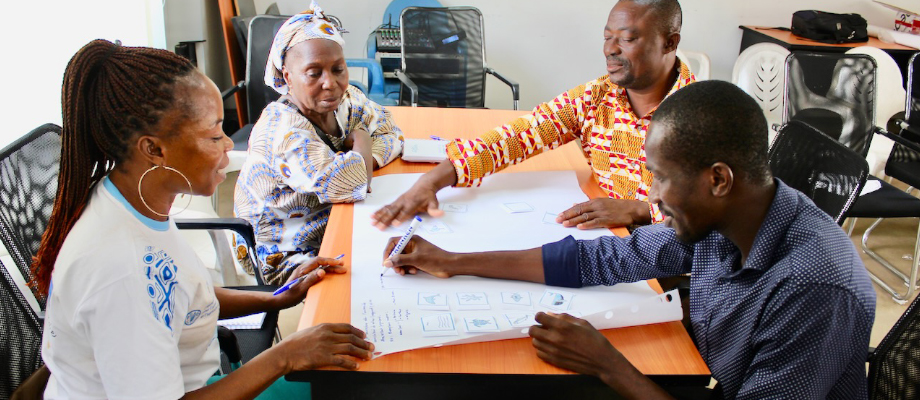Hands-on training on the Ecosystem Approach to Fisheries empowers local fishing communities in Côte d'Ivoire

24-25 April 2024, Sassandra, Côte d'Ivoire – A training session on the Ecosystem Approach to Fisheries (EAF) was held at the Sassandra pier, aimed at strengthening the knowledge and skills of local actors in the sustainable management of fisheries.
The goal of this initiative was to provide participants with an in-depth understanding of the EAF process. This fisheries management approach considers the complex interactions between ecological, biological and environmental aspects of the marine ecosystems, human activities, the governance system and external factors like climate change.
Specifically, the training aimed to deepen the participants understanding of the fundamental concepts of the EAF, highlight the challenges and opportunities associated with this approach, and inspire through hands-on exercises simulating the EAF process.
During two days of dynamic and interactive exchanges, the twenty participants, including eight women and twelve men, explored the different stages of the EAF. Under the expert guidance of specialized trainers from the EAF-Nansen Programme and the FAO-GEF Coastal Fisheries Initiative (CFI), they immersed themselves in the basic principles of this approach. Visual tools, role-playing and practical exercises paved the way for the success of this immersive experience, promoting a deep assimilation of knowledge.
The results of the training were promising. The lively discussions revealed a collective awareness of the complex challenges fishing communities face. The importance of a thorough diagnosis and prioritization of problems to find sustainable solutions was rightly emphasized.
Mr Raymond Taha, Regional Director of the Ministry of Animal and Fisheries Resources in Sassandra, expressed his confidence in the training's transformative potential. "I wish to express my utmost confidence in the transformative potential of the training. It is my firm belief that this initiative will empower participants to proficiently navigate the intricacies of the Ecosystem Approach to Fisheries (EAF) and thereby facilitate the formulation of robust, sustainable management strategies for our local fisheries," he said.
Mr Sougohi Serge, coordinator of the NGO Afrique Verte Environnement, expressed his utmost satisfaction at the end of the training. "I could say that this training in EAF implemented by the FAO is of capital importance since it places local actors in the sector at the heart of the rational management of the resource while allowing them, not only to feel valued, but also to have a deeper vision of the field that is their”' he affirmed.
In conclusion, this training underlined the need to strengthen the technical and organisational capacities of those involved in fisheries, while encouraging mechanisms for community consultation and exchange. Dimitra Community Clubs were mentioned as promising tools to promote better ownership of the process and inclusive and collaborative management of marine resources.
These clubs are informal, community-led groups comprising both women and men from diverse age groups. They function as safe havens where members unite to tackle local challenges and enhance their communities. Furthermore, local radio stations play a pivotal role in amplifying awareness and participation in Community Listener Club activities, extending their reach to a wider audience and fostering community involvement. By airing discussions, meetings, and events concerning these clubs, local radio stations champion transparency and inclusivity in decision-making processes.
This meeting marks an important step towards sustainable and balanced fisheries, thus ensuring access to aquatic food for future generations. Sassandra, with its natural and human wealth, stands as an inspiring example for fishing communities worldwide.
About the Programme
The EAF-Nansen Programme is a longstanding partnership between the Food and Agriculture Organization of the United Nations (FAO) and Norway, executed in close collaboration with the Norwegian Institute of Marine Research (IMR).
The Programme is also one of the endorsed ‘Decade Actions’ under the United Nations Decade of Ocean Science for Sustainable Development (2021-2030).
